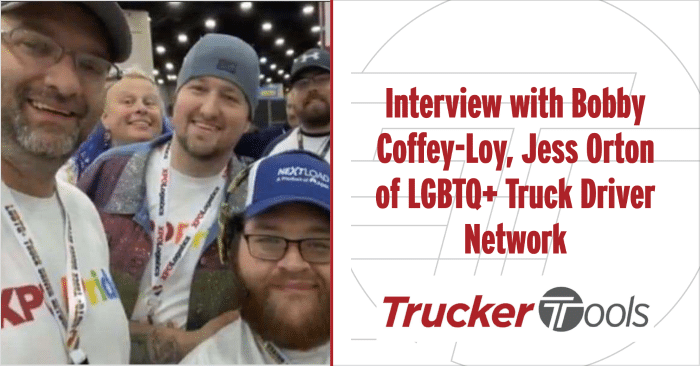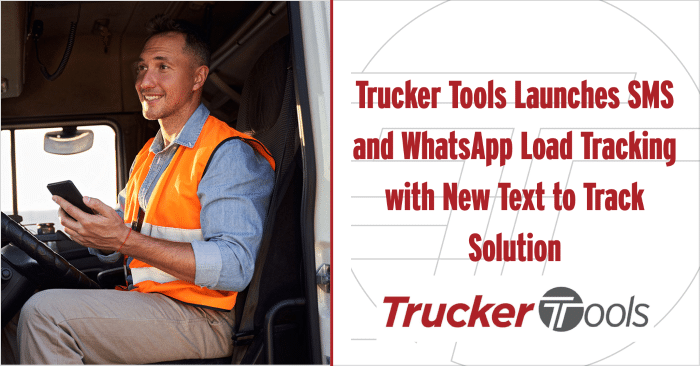Craig Bliss is the creator and moderator of the Facebook networking group Freight Brokers & Truck Drivers. Craig also hosts the podcast Talk Freight w/Craig Bliss and is co-owner of Freightbrand, a carrier-focused consulting agency based in Phoenix, Ariz. Drawing on his previous experience working as a shipper, broker, and carrier, Craig helps businesses identify areas for potential operational improvement and gain a better understanding of how to maximize their earning potential. Trucker Tools recently spoke with Craig about the challenges and changes that carriers and brokers currently face, and what they can expect to encounter in the coming year.
Thanks for speaking with us today, Craig! To start with, can you please tell us a little bit about your background?
“I started in the industry about 10 years ago on the brokerage side, matching freight with drivers. Since then, I’ve gone from the brokerage side to the shipper side to the carrier side, so I’ve actually learned about all three sides and how they operate. I’ve used that knowledge and my training and experience from the different divisions to become a logistics consultant, mostly for small fleet owners and owner-operators. I help them improve their operations, first by helping them make better decisions within their operations, and also by helping them to get organized. I help them become more attractive to shippers and brokers and make more money. I’ve been doing that for a few years now, independently.
I also run a Facebook group for freight brokers and truck drivers. I started about three years ago when I was looking for a way to network with more freight brokers and trucker drivers. Over the last three years, the group has grown quite a bit. It’s become more of a resource group. I manage the group, providing my input and also matching people with freight with people who are looking for freight. I try to be a valuable resource to the trucker drivers in the groups, as well. I’ve also recently added a freight broker only group.
Over the last 10 years, working on all sides of the industry and running my Facebook group has helped me become pretty well-rounded in a short amount of time. I say it’s a short amount of time because there are veteran truck drivers who’ve been driving for 40 or 50 years. I try to help these drivers modernize their businesses. I try to make it a little bit easier and better for them to interact with brokers and different shippers because it’s definitely different than it was 10, 20 or even 30 years ago.”
How do you think these interactions between owner-operators/small fleets and brokers/shippers have changed over the years?
“Technology has played a huge role in the change. Twenty or 30 plus years ago in the logistics industry, you would pick up the phone and make a lot of phone calls — maybe 100 — every day to find the trucks to cover your freight. You would build relationships with drivers and it was more personal. But as technology has evolved, for example with load boards, some of that (building personal relationships) has been taken away. If you look at tracking now, a lot of it is done through technology. In logistics as a whole, technology has improved the trucking industry.
However, for the veteran truck drivers, the ones in the million-mile club who’ve been doing it for years, it’s harder for them to adapt because technology has kind of hit them all at once in the last five to 10 years. I believe it’s a little bit challenging for them to adapt to new technology, but once they do adapt, they see that it’s a lot easier to manage their businesses, make more money and rebuild those relationships they once had back in the day with their brokers, one-on-one.”
What are the top challenges faced by small trucking companies?
“Right now, more than ever, it’s rates and freight volume in the market. Last year was a historic year for all sides of the industry — a ton of freight was out in the market, but also a ton of money for the available freight was out in the market. So a lot of drivers and carrier operations got accustomed to that. This year is vastly different from last year. A lot of people started their operations or grew their fleets last year. This year, we’re seeing a lot of shutdowns because of the decrease in rates and the decrease in volume.
But it’s not only because of rates. Drivers, carriers, and fleets that are managing their operations during this down curve right now have issues with waiting at shippers and receivers, as well. When drivers wait either at a shipper or receiver for an excessive amount of time, let’s say more than two to four hours, that cuts down their driving time, which results in them driving fewer miles, which means a lot less money at the end of the week when they add it up.
A lot of people see detention as just waiting a few more hours, but owner-operators and small fleet owners look at it as they’re losing a lot of money at the end of the week. Not only that, they’re supposed to get paid for wait time when it goes over the predetermined time limit, but drivers are noticing that their brokers and the people they partner with aren’t paying for detention time. So not only are they (owner-operators and small fleet owners) losing money at the end of the week just simply by wasting time waiting, but they’re also not getting paid to recoup those expenses in the form of detention pay. Those are the top challenges I see drivers facing right now in the industry.”
What are the top challenges faced by brokers in today’s market?
“Since I started out on the brokerage side, of course, I still have a soft spot for the brokerage side and talk with a lot of my brokerage friends. The big challenge I see them facing is competition within the industry. Not only do you have a lot of new brokerage authorities being granted every quarter, but you also have a lot of mega brokers like Uber and others who are really standing out in the industry and creating a lot of noise. I actually just created a video today about how you cannot compete with these mega brokerages. You don’t need to because there’s technology available to brokers and agents that is very similar to the technology that these mega brokerages offer that can capture a large market share. So brokerages are facing a lot of challenges with competition and the rise of digital brokerages. Margins are already low, but they’re tightening up even more as these digital brokerages kind of stand out more in the industry.”
How are truckers and brokers successfully addressing these challenges?
“It’s pretty consistent on both the carrier/trucking side and on the brokerage side. It’s the operations that adapt to change and stay creative during the change — those are the ones that I’m finding are successful even when the market goes down. I’m finding that carriers and brokers who are just rolling with the change, who are being creative with introducing new technology, features, and services to retain drivers, they can handle the difference in the market rates and prices with their shippers. Those are the ones surviving and, as I always say, the market will get better. This isn’t the first time it’s been like this. It will get better. You just have to do what all the megas are doing, which is adapting to change.”
Your Freight Brokers & Truck Drivers Facebook group has over 16,000 members and your freight brokers only group has more than 4,700 members. What need do you see your groups addressing for the broker and trucker communities?
“Facebook groups are creating transparency in the industry. Even five or 10 years ago or so, a lot of people didn’t even understand the challenges trucker drivers face and what happens behind the scenes with truck drivers. There was a lack of understanding of how drivers are out on the road away from their families for days or even weeks at times — and that’s because of those Amazon packages we all receive every day. The Facebook group started growing when we started to see the mainstream media bring up some of the industry’s challenges. That’s when drivers started feeling like they had a voice.
What I notice now is that drivers start coming to the group to voice their opinions. When it’s about detention issues they’re facing in the industry with shippers and receivers, they do that in hopes that their brokers are members of the group or that members of the group work for those shippers or receivers and can get them to realize the challenges drivers face when they wait.
Drivers voice their opinions about tracking issues, as well. A lot of owner-operators and small fleet owners don’t understand the need for tracking and visibility on freight. A lot of times, they look at it as it’s my phone or it’s my truck and I don’t want to be tracked. But then they go into the Facebook group to express concern about tracking and other truck driver members who are familiar faces in the industry can tell them, ‘You know, here’s my experience with tracking. I was just like you at one time. I started to use it and here’s what I got out of it. Here’s what it changed.’ Often, I see the original poster will actually change their opinion just from simply interacting with people in a familiar, moderated community. What drivers are really looking for is a place to get their needs, concerns, and frustrations out.
The brokerage side is very interesting because brokers get a few things from the Facebook groups. They get a lot of professional help from other members who are just like them — whether they are an agent or they have their own successful brokerage. A lot of brokers look to other brokers for advice because of the operational challenges that can come up throughout the week or the month. They can go to a trusted community to get that advice.
But not only that — a lot of the group members read in the shadows and are active on the back end where they read and comment but don’t post. What they’re getting out of that is that they’re responding to truck drivers’ concerns and finding out what they can do to improve things. They’re also seeing what truck drivers like, what they’re looking for, and they are using that feedback and those tips that they’re reading in the group to introduce a new technology or process in their operations.”
There’s a lot of talk about load tracking and visibility — for brokers, 3PLs and shippers it’s a necessity, but many brokers/3PLs are still tracking freight manually. Why is that? What’s your take?
“What I see from working all three sides of the business, but especially from the broker and shipper side, is the importance of freight visibility and tracking. As a broker who is responsible for that freight, I need to be able to have ‘all eyes’ on the freight when I need to provide updates to my shipper. It’s kind of like when you order something from Amazon. You expect to know where it is at every minute of the day and Amazon provides that information to you through simple tracking.
With truck drivers and logistics, it is a bit different because the tracking for brokers and shippers comes at the expense of drivers. Drivers have to manually download that app or manually dial that phone number to set up tracking on their personal phones. With my driver or carrier division hat on, my first thought is privacy. ‘How often are you going to track me and when are you tracking me? What do you see? I want to know.’ They may worry that the tracking technology is wasting their data or that they’re being charged for the data or tracking-related messages they’re receiving. I can relate to those concerns.
However, having been on the broker and the shipper side and being very familiar with the different tracking applications in the industry, I know that a lot of the tracking technologies aren’t as invasive as drivers think they are. It comes down to education. I even did a walkthrough video recently that shows what a broker can see from certain tracking applications so that drivers will feel more at ease in using tracking apps. The main concern I hear from drivers about using tracking applications is, ‘Is it going to charge me?’ Also, ‘How long is this broker or shipper going to track me and when will the tracking stop?’ That’s mainly what drivers want to know. The more that companies educate drivers on that, the more that drivers will feel more at ease and accepting of tracking.
Because Trucker Tools’ load tracking is so easy to do and because it’s already built into an app that truck drivers already are accustomed to using, they feel they have more control over it because they have the option to manage the tracking as they see fit. That’s what it takes for truck drivers to feel more at ease with tracking — more control. So I do see tracking compliance actually increasing across the board, more so than I did last year or the year before.”
What kind of value does Trucker Tools bring to brokers and carriers?
“The reason why I aligned my Freight Brokers & Truck Drivers Facebook group with Trucker Tools is because Trucker Tools is an ally to both brokers and truckers. Trucker Tools addresses the trucker side and the broker side. As the name of the Facebook group suggests, I’m all about bringing the two communities together to help one another because, at the end of the day, they need each other. If you look at the features included with Trucker Tools’ Smart Capacity platform, even though it’s a platform for the broker, many of the built-in features actually help the trucker, as well.
The free tools that are provided to the trucker in the driver app also help truckers find fuel and factor through weigh stations. When brokers send a tracking request through the app to truck drivers or vice versa, both sides benefit. The broker wants the driver to use the Trucker Tools driver app for tracking, but the driver can still benefit from the app because of the other tools that are included in the app. Because Trucker Tools is an ally to both truckers and brokers, I feel like me and my Facebook group align really well with Trucker Tools.”
It seems like the trucking industry is constantly evolving and changing. What do you see on the horizon for upcoming changes?
“In the short term, I see the market balancing out to be more predictable in about a year. The trucking industry evolves about every three to five years, sometimes a little bit sooner. However, for next year, I definitely see the market and the industry a lot more balanced. Right now, there’s a lot of talk about more technology emerging, such as autonomous trucks. But I don’t see that being mainstream in the next year. I do think technology like freight matching and other technology features will be more consistently used than they currently are.”
Is there any particular trend or technology or change that’s happening that you’re excited about or that you think that holds a lot of promise for the industry?
“My broker friends won’t agree with this, but I am excited about the rise of the digital brokerages. When I say that, I mean apps and websites that match drivers with freight. I’m excited about them because I’m all about efficiency. We do have quite a few digital brokers in the space right now, a lot of mega digital brokerages. I believe in the next year or two that there will be a little more room for more mid-sized digital brokerages to enter the space and that’s what I’m personally excited about.
On the trucking side, a lot of technology is being introduced to help out truck drivers, where drivers almost aren’t needing the help of a third-party dispatcher because they can start booking all of their freight and all of their reloads using apps. The emerging new technology available to truck drivers is very easy to use. So those two things, the digital brokerage space and the new technology that’s emerging to help trucker drivers on the road — that’s what I’m very excited about in the coming year.”
What do you like most about working in the trucking industry?
“To be honest, what I like about it is how it’s always changing. I didn’t grow up in trucking. I fell into the industry and so I’m just constantly learning. I’m constantly looking up and posing questions to different drivers, brokers and other people who work in the transportation industry. I’m excited about the changes. I’ve witnessed many changes in the short 10 years I’ve been in the industry and I’m very excited to see what changes will come in the next 10 years. I can’t guarantee what the changes will be, but I can guarantee that it’s going to be a lot different than what I think it will be.
That’s what keeps me in the industry. I’m constantly adapting, changing who I can help and thinking about how I can provide more resources to different people, such as freight agents, truck drivers or people who are looking to become truck drivers. I’m always getting creative with who I can reach and who I can help out. I’m going to be in it for the long haul as a resource and will keep learning and keep witnessing these changes that are happening in the industry.”
Is there anything else that you’d like to share that you think is important?
“Technology is going to be big in the next few years and I think talking about what could happen next with technology really helps drivers plan and make better-informed decisions. At the same time, sometimes truck drivers hear about futuristic technologies on social media or in the news and get the impression that technology like autonomous trucks will be introduced within the next year and put them out of business. They start panicking. But I think we’re many years from that kind of technology being a reality in trucking.”
Craig Bliss is the founder and moderator of the Facebook networking group Freight Brokers & Truck Drivers. Craig also hosts the Talk Freight w/ Craig Bliss podcast and is co-owner of Freightbrand, a carrier-focused consulting agency based in Phoenix, Ariz. For more information on Craig and his Facebook group, visit https://www.facebook.com/groups/freightbrokers/.
To download Trucker Tools’ free mobile driver app, visit https://www.truckertools.com/carriers-toolkit/.
Brokers, schedule a free demo of Trucker Tools’ Smart Capacity.






